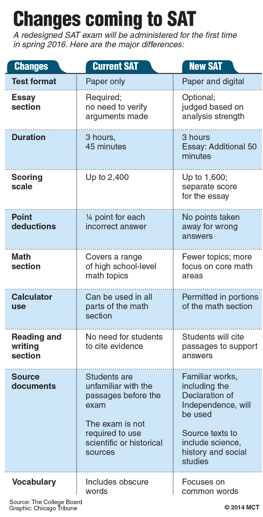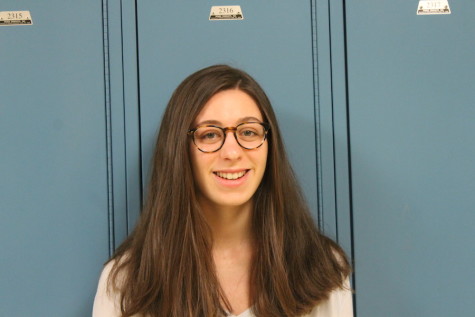
The College Board announced changes to the SAT, which will go into effect in 2016, on Wed. March 5, citing a disconnect between school curriculum and the content of the exam. It will be split into three sections with an optional essay portion and will go back to a 1600 scale instead of the current 2400.
Julie Heller, head of the English Department, supports the changes being enacted.
“It makes sense that he [the President of College Board] would try to bridge the gap between high school expectations and college entrance expectations,” she said.
As part of the changes to the exam, the vocabulary section is being edited to include words frequently used in college, which Heller explains “just makes sense.”
The math section will be changed to assess three areas: problem solving and data analysis, the heart of algebra, and passport to advanced math. Math teacher John Wetzel saw more value in the old format of the SAT because “it focused on patterns and reasoning in conjunction with math content,” he said.
Heller explained that altering the exam to study and analyze content in a real world context correlates with the Westport 2025 initiative.
“[Westport 2025] helps students develop their thinking skills (critical, creative, and global) in connection with real-world situations, so…this stresses the importance of our efforts,” she said.
Wetzel also pointed out that Westport’s curriculum fits well with the new content. “The new SAT is more aligned with basic ‘study-able’ curriculum as opposed to thinking non-routinely, so I envision little impact on curriculum or teaching at Staples,” he said.
Science teacher Cecilia Duffy suggested that the College Board change to adopt the science section like the ACT, as the changes being made are making the tests more similar.
“I’m still upset that there is not science component to the SAT like the ACT. I think that’s part of the whole problem,” Duffy said.
Perhaps the most significant change is to the scoring of the test; there will no longer be a penalty for guessing. Heller sees this as “the glass half-full.”
“It’s always better to show what a student knows and can do rather than highlight what he doesn’t know or can’t do,” she said.














































